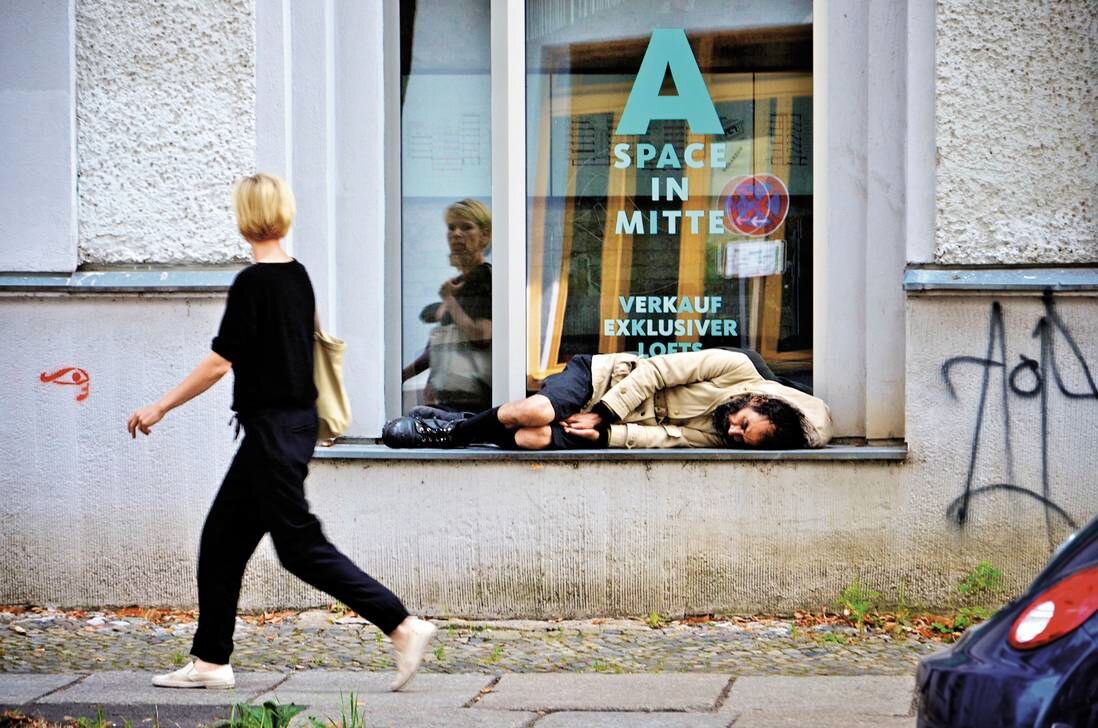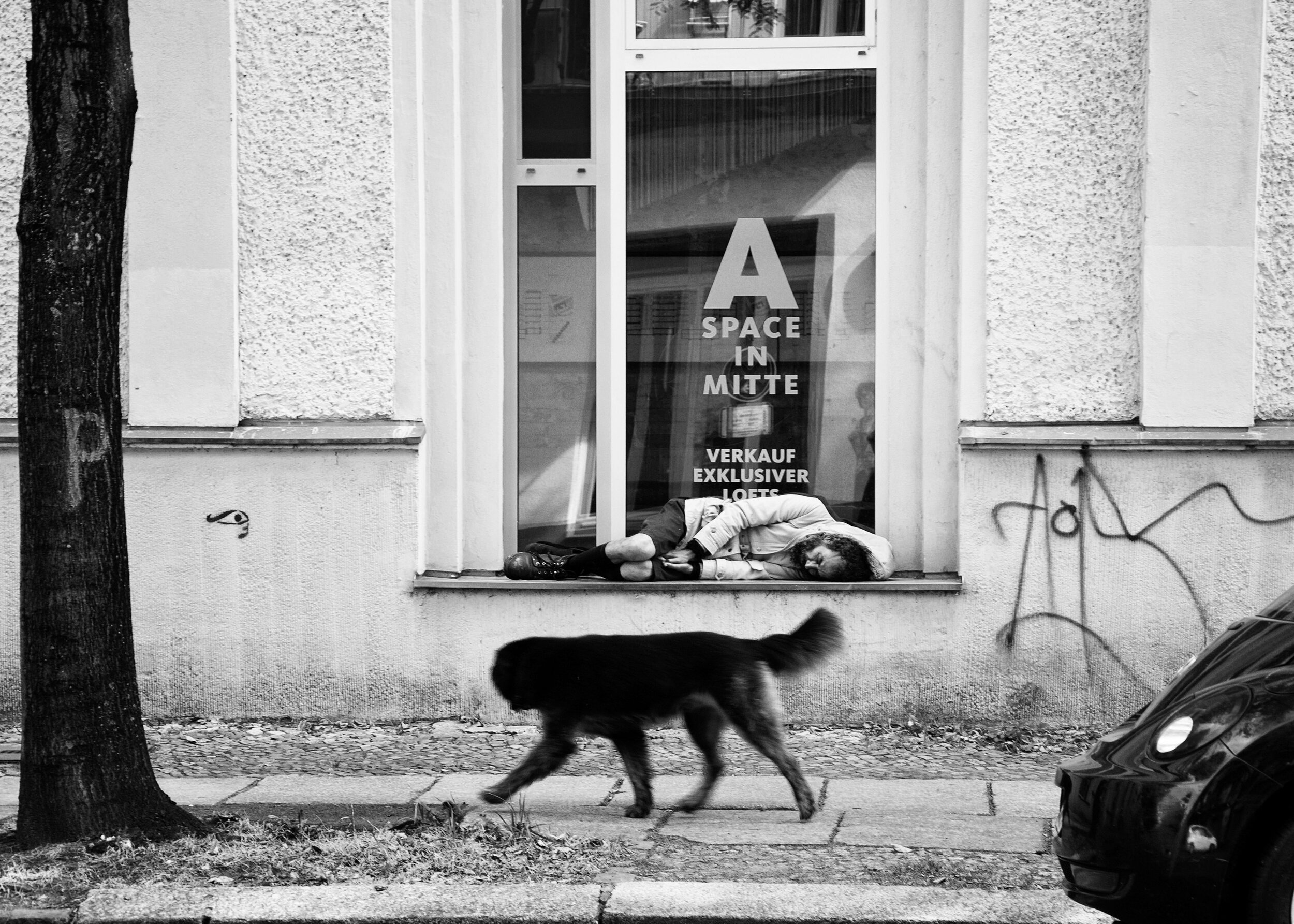A space for dreams
by Batsceba Hardy
Years ago I picked up my camera again and started taking street photos.
In the seventies, I was a professional photographer. I was a theatrical performer and I photographed the avant-garde theatre and beyond, for magazines and newspapers.
Theatre and street are not very different for me, in both cases I become invisible, I observe and choose what to tell. It’s a way of documenting with your own personal filter. Of telling.
Actually, I have spent most of my life telling stories. I chose to tell them to the kids and young adults, because through adventure it is easier to wake up the brains and make them think.
After all, telling is always documenting ...
Just writing for boys I had my first meeting with the homeless. Every day I took my dog, a huge German shepherd, to the park and every day I met the same people: men and women with empty eyes, dressed in winter and summer in the same clothes. And this has always struck me hard.
It was the nineties and poverty was becoming endemic again, in Italy too. I wrote a book about these invisible people, I approached them in my own way, from afar, bringing winter blankets, clothes, sometimes money. I received smiles and insults. They also threw stones at me.
But why am I telling you this?
Because, becoming a street photographer, years later, I found myself facing a stupid debate: is it correct to photograph poverty? Isn't it too easy? Shouldn't you help them instead of photographing them? In the debate that I found open on the social network where I started posting my photos I found this answer, which I think also best expresses my thoughts:
“I could bankrupt myself in a week trying to eradicate poverty, and make no difference what so ever. The issue is not what I have and another doesn't, but how I deal with what I have. Those that use what they have to dominate and extract substantially more from others, at any cost, will destroy you and me in an instant. And could eradicate poverty in a generation. But for 1000's of generations, the powerful have not chosen this route. But their damage, their greed, has been held in abeyance by the consciences that are pricked by those who communicate the "other", uncomfortable truth. The victim - of violence, of poverty, of abuse systemic or specific - cannot, at that moment speak. They have no voice. And it is by recording and communicating their reality that we keep consciences keen, and put some stay to rampant greed. Whether by giving the poor dignity by showing them as human too, with all that that means, or by highlighting oppression and violence as the professionals do. If you did not, who would? And the decline would be faster.
IIRC, Phillip Bloom tells of taking news footage of people frantically digging through earthquake wreckage, looking for survivors, and couldn't take it any more. He put the camera down and started to help. And the people said to him - 'take the video - the world needs to see this, and send help'. “ Grant Hillebrand
All around me I see many more images of wealth, fashion and beautiful women and muscular men. Sometimes the terrible pictures of deaths at sea, or in wars. But I no longer see images that represent the poverty that is beside me... I don't see the daily despair. Not in newspapers, in magazines, on billboards and even in movies...
And I'm convinced that people who are economically well off don't see the poor ...
And that's why in Progressive we talk about poverty, we have a Gallery and many articles that discuss this subject.
And every time we find ourselves debating with some new member and we have to 'defend' our point of view.
No, we will not win any Pulitzer Peace Prize, but we will always carry on our speech, with consistency and awareness. Our contribution to 'truth'.
As a child, I wanted to be a veterinarian, but I never was able to, because I can't stand suffering. Too much suffering makes me sick. I have a fever, I have migraine attacks. This is why I am not suitable for 'helping' physically. It's my limit, but I can always find another way.
For this, I write and photograph. And for this I have always photographed poverty from afar, trying to tell a story, finding the situation that highlights the message.
In this way too, I detach myself from the 'rules' of the street, proximity. But I'm an anarchist like the Gang that gathered around me. Restrictive rules that leave no room for fantasy and intelligence and freedom do not interest us.
One last thing. In my latest novel, the protagonist is a woman who has lost everything. The character was born from an encounter with a homeless Berliner ... Elfriede. No, I never talked to her, I just gave her some money when I met her. I gave it a name. I don't think I stole anything from her ...
Peace and love
A space for dreams
"Space for everything and everyone: From 71 to 202 square meters, the residential lofts in A SPACE make family dreams come true, but even space-conscious singles or couples will find something to suit them from the 24 individual floor plans. The open-plan living, kitchen and dining area in the large lofts is complemented by one to three separate rooms. Depending on the layout, there are dressing rooms, utility rooms or storage areas. And, of course, a fantastically spacious bathroom with a separate guest WC comes as standard, as does the sun terrace or balcony. "
... Humanity -definition-: all human beings collectively...
"Silent poverty is just around the corner. Urban poverty has surpassed rural poverty in importance, and the countries with the largest number of poor people are middle-income countries, not the least developed countries."
Berlin
Elfriede
Milano
“We're not stupid! We're just poor! And we have a right to insist on this distinction”
― Orhan Pamuk, Snow















